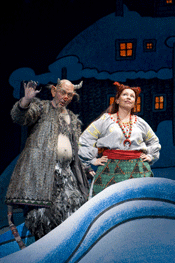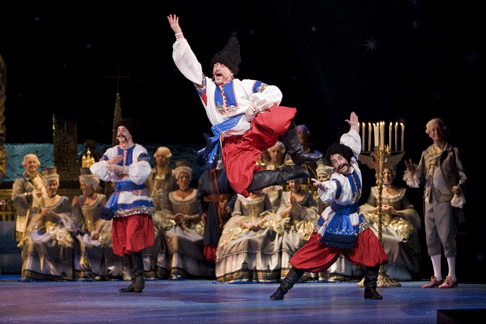Tchaikovsky’s seldom seen opus is not, to be sure, in the same league as his
Onegin, Queen of Spades or even Mazeppa. But
Slippers is nevertheless chockful of the musical ingredients that
inform the composer’s weightier works, and the master’s melodic gifts were
often in evidence. Most of us (this listener included) were afforded that rare
experience of discovering a work that was totally new to us, even if the
musical vocabulary was well grounded in our ears. Each character was afforded
at least one major set-piece, and if we were often at odds over the
“do-we-clap-or-shouldn’t-we?-dilemma,” that only added to the
evening’s spontaneity.
The riotously colorful production design appeared as though the creators had
taken the most magnificent Palekh lacquer boxes, the airiest of Arthur Rackham
drawings, and the wittiest work of Maurice Sendak — put them all in a bag
and shook them up — and then let them tumble onto the stage of the Royal
Opera. Seldom has a stage picture(s) been so effective in furthering the
effectiveness of a comic opera.
 Maxim Mikhailov as the Devil and Larissa Diadkova as Solokha
Maxim Mikhailov as the Devil and Larissa Diadkova as Solokha
Set designer Mikhail Mokrov devised a spectacularly busy show curtain that
delighted the eye and established the tone of the proceedings. One remarkably
apt effect followed another: a beautifully judged deep blue town drop with the
requisite devil painted on the church steeple in a field of orange;
meticulously detailed rustic interiors; a host of wagon insets that were as
functional as they were cheeky; a haunting moon drop; a joyous Maypole (or
whatever-the-heck a Maypole is called in winter!); and tongue-in-cheek flying
effects as the characters take wing on their broomsticks.
Too, there was never a false moment in the atmospheric specials and area
illumination of Rick Fisher’s splendid lighting design. Tatiana Noginova
took full advantage of the vivid possibilities of folk costuming to fashion
dazzling attire that was at once eccentric, eye-catching, complementary to the
scenery, and complimentary to the performers. Ms. Noginova not only charmed us
with faux animal/devil costumes, but also impressed us with the easy elegance
of the dancers’ attire for the more formal ballet segments.
Having recently read some article or another expounding on the loss of
national personality in Russian voices, that writer obviously never hear this
bunch of soloists. For here was a whole cast (not all Russian) who had
“the sound.” You know, the kind of edgy, full-throated sound with
generous vibrato that the likes of Vishnevskaya once commanded.
In the key role of Oxana (she who asks for her lover to bring her the
titular footwear), Olga Guryakova had a lot going for her. A little too much,
perhaps at first. In the first act, Ms. Guryakova seemed a bit too loud and
full-throated for the music at hand. Her first aria and scene inside the house
cried out for limpid, plangent singing above the staff, and while she certainly
had all the notes and sang musically, I couldn’t help but wonder what Renee
might have made of those hauntingly lovely phrases. But then, whoa, wait a
minute! The demands on our heroine ratcheted up in Act Two, and let me tell
you, that pretty-as-a-dainty-princess Olga rode the orchestra with ease, and
with clarion high notes. Thrilling stuff that. My previous experience with her
gifts was in the title role of Rusalka in Brussels last season and I
remember thinking then, too, that while she is very talented and stage savvy, I
wish she could caress the melancholy phrases as effectively as she commands the
stentorian passages.
 Cossack dancers
Cossack dancers
It is perhaps unfair to muse too hard or long on Vsevold Grivnov’s
take on Vakula since he was announced as “feeling a cold coming
on.” He is a charming bear of a personality that really emanates a
happiness to be on stage, and much of his singing gave pleasure. He seemed to
be holding back on this occasion, as his pleasing tenor lacked the same vocal
presence as his soprano’s. He sings big roles in major houses, manages to pace
himself to spout some buzzy top notes when required, and performs with
conviction and stylistic acumen. I would certainly love to hear Mr. Grivnov
another time when he is operating at full steam.
The formidable Larissa Diadkova is flat out giving the star performance of
the show as the witch Solokha. Hers is a rock solid technique with a thorough
understanding of communication of vocal line and text, delivered with a killer
smile and a set of pipes that can pin you to your seat. Ms. Diadkova is
peerless in this repertoire, and she seems to be having the time of her life.
So are we. Veteran Sergei Leiferkus may not have the mellifluous spin in his
baritone of yore, but he sang with unparalleled elegance and poise. A sprightly
Maxim Mikhailov worked the stage delightedly and offered a cleanly sung,
cliche-free Devil.
Viacheslav Voynarovskiy and Alexander Vassiliev did all that was required as
the Schoolmaster and Pan Golova, respectively, not least of which was walking
around “trapped” in sacks to avoid discovery after their lusting
visits to Solokha. Vladimir Matorin (Chub) was certainly extremely tall and
extremely loud. This is a big voice and a big boy, but I had the feeling that
Matorin was content to let his stature and volume do the job of creating a
character, of which there is more to be mined with a more thoughtful reading.
John Upperton was a secure Panas and Jette Parker Young Artist Changhan Lim
showed real promise with a lovely rendition of the Wood Goblin.
Last but surely not least, Gary Avis, Mara Galeazzi and the other dancers of
the Royal Ballet contributed mightily to the evening’s magic with highly
assured performances of Alastair Marriott’s memorable choreography. In
fact, so fine, so clean was the execution of the substantial dance segments,
that it had the unfortunate effect of throwing into high relief the fact that
the stage direction was. . .well. . .a bit clunky.
I have enjoyed Francesca Zambella’s work on a number of occasions. .
.with musical drama. The talented Ms. Zambella seems less attuned to lighter
works (at least based on this show and the rather tepid The Little
Mermaid.) The cast is certainly gamely giving their all. However,
enthusiastic mincing and prancing; unabashed mugging and playing to the
balcony; and random semaphoring are not a substitute for comic interaction
grounded in honesty and natural by-play. The specificity and focus of the
director’s dramatic work were too often absent here.
Conductor Alexander Polianichko offered quite a substantive reading that
seemed infused with the correct style and which ultimately blossomed into
spirited music-making. For the first third of the evening, however, the pit
seemed a bit off form, indeed curiously muted, with a couple of fluffs in
exposed solo work that are surprising from a band that is usually spot on.
Happily, midway through Act One the group caught fire and kept up a polished
rendition to the end. I have to say, it was curious to have reprised the final
chorus accompaniment as instrumental curtain call music! A first for me in the
opera house. . .
Minor carping aside, the Royal Opera took a gamble that the public would
welcome a work that was virtually unknown, and welcome it they did. As the
giant golden shoe rolled on at show’s end and served as a lovers’ carriage, I
was quite ready to watch it all over and be enchanted again. It is to be hoped
that this winning production might have a long life, for the piece deserves a
wider hearing. In the end then, the Slippers fit, the audience
cheered, and if we came out (just a bit) humming the scenery, it was a grand
occasion, fit for a Tsarina.
James Sohre


